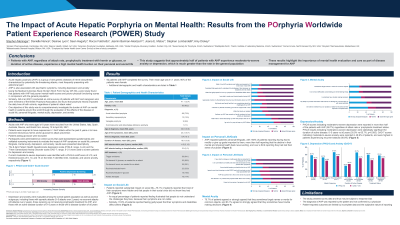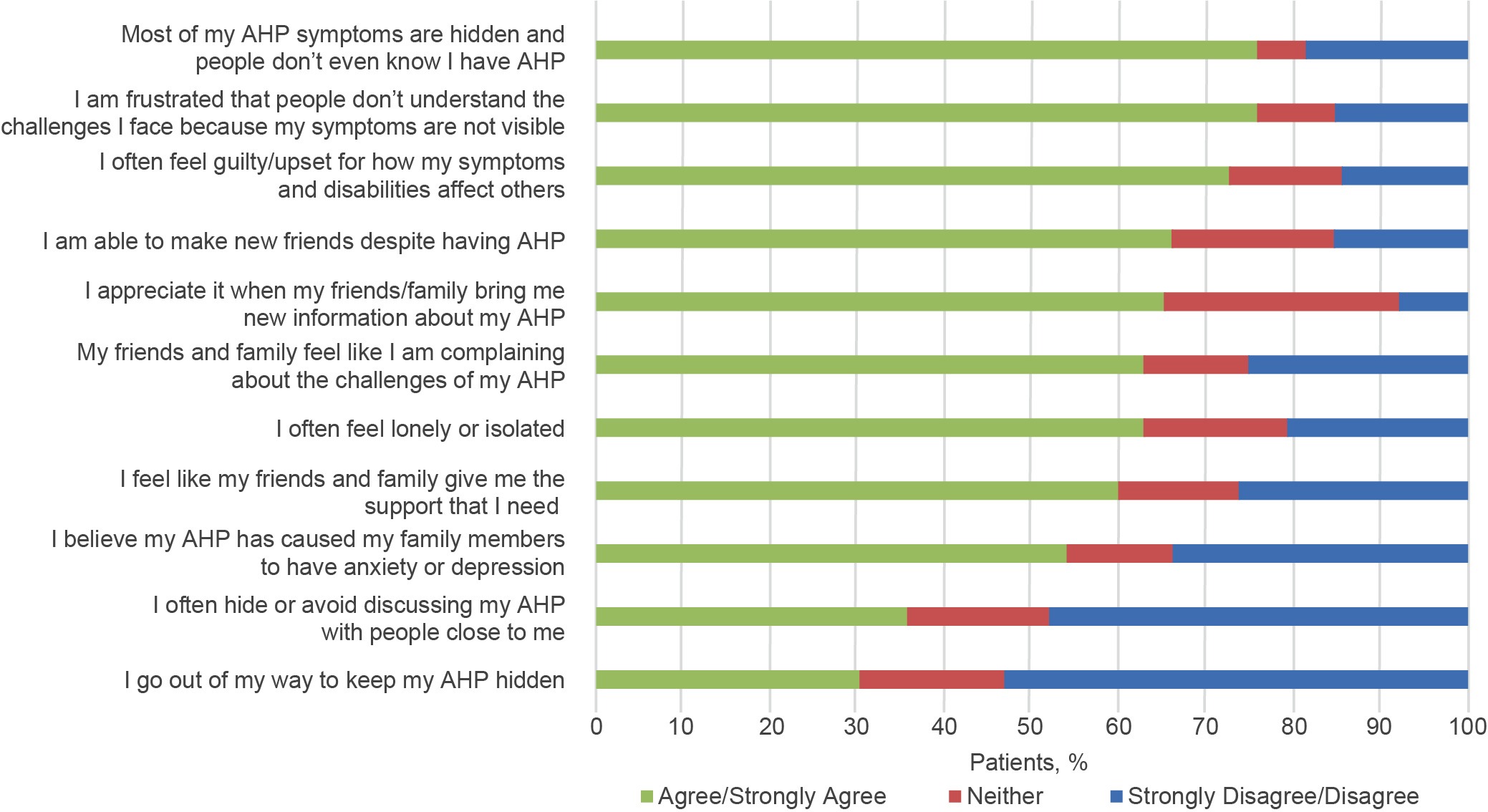Back


Poster Session D - Tuesday Morning
Category: Liver
D0485 - The Impact of Acute Hepatic Porphyria on Mental Health: Results From the Porphyria Worldwide Patient Experience Research (POWER) Study
Tuesday, October 25, 2022
10:00 AM – 12:00 PM ET
Location: Crown Ballroom

Has Audio

Stephen L. Meninger, PharmD, MS, MBA
Alnylam Pharmaceuticals
Cambridge, MA
Presenting Author(s)
Stephen L. Meninger, PharmD, MS, MBA1, Danielle Nance, MD2, Desiree Lyon, MS3, Sean R. Hegarty, 4, Rocco Falchetto, PhD5, Jasmin Barman-Aksözen, PhD5, Joana E. Matos, PhD6, Stephen Lombardelli, MB, PhD7, Amy Dickey, MD, MSc8
1Alnylam Pharmaceuticals, Cambridge, MA; 2Banner Health, Gilbert, AZ; 3American Porphyria Foundation, Bethesda, MD; 4Global Porphyria Advocacy Coalition, Durham City, England, United Kingdom; 5Swiss Society for Porphyria, Zurich, Zurich, Switzerland; 6Cerner Enviza, North Kansas City, MO; 7Alnylam Pharmaceuticals, Maidenhead, England, United Kingdom; 8Massachusetts General Hospital, Boston, MA
Introduction: Acute hepatic porphyrias (AHPs) are a group of rare genetic diseases of heme biosynthesis characterized by potentially life-threatening attacks and associated with psychiatric symptoms, including depression and anxiety. This study investigated the burden of AHP on mental health, social life, personal life/goals, depression, and anxiety.
Methods: Adults with > 1 AHP attack within the past 2 years or receiving intravenous hemin and/or glucose for attack prevention, were administered in an online survey from January 19 to April 26, 2021. Patients taking givosiran were excluded. Patients were evaluated using the 8-item Patient Health Questionnaire depression scale (PHQ-8; range, 0–24; ≥ 10 identified moderate-to-severe depression) and the 7-item Generalized Anxiety Disorder scale (GAD-7; range, 0–21; scores of 5, 10, and 15 identified mild, moderate, and severe anxiety, respectively). Depression and anxiety were also evaluated in those with sporadic vs recurrent attacks (0–5 vs ≥ 6 attacks over 2 years), those receiving vs not receiving prophylactic treatment for AHP, and those with active disease duration 0–5 vs ≥ 6 years.
Results: Of 92 patients with AHP, mean age was 41.1 years and 90% were female. Impact on social life was substantial; 76.1% of patients reported that most symptoms were hidden and people in their social circle did not know they had AHP. An equal percentage reported frustration at the lack of understanding of the challenges they face. Similarly, 72.8% of patients reported feeling guilty/upset that their symptoms and disabilities affect others (Figure). More than 80% of patients reported having to modify or give up important goals; over half of patients reported that the decline in their mental and physical health feels never-ending, and over one-third reported loss of sense of purpose. PHQ-8 scores indicating moderate-to-severe depression were reported in more than half of patients (58.7%) regardless of attack rate or prophylactic treatment status. GAD-7 scores indicating moderate-to-severe anxiety were reported in 48.9% of patients and were highest in those experiencing recurrent attacks (56.8%).
Discussion: Patients with AHP experience a high mental health burden, regardless of attack rate, treatment received, or duration of active disease. Approximately half of patients with AHP experience moderate-to-severe anxiety or depression, highlighting the importance of mental health monitoring in disease management for AHP.

Disclosures:
Stephen L. Meninger, PharmD, MS, MBA1, Danielle Nance, MD2, Desiree Lyon, MS3, Sean R. Hegarty, 4, Rocco Falchetto, PhD5, Jasmin Barman-Aksözen, PhD5, Joana E. Matos, PhD6, Stephen Lombardelli, MB, PhD7, Amy Dickey, MD, MSc8. D0485 - The Impact of Acute Hepatic Porphyria on Mental Health: Results From the Porphyria Worldwide Patient Experience Research (POWER) Study, ACG 2022 Annual Scientific Meeting Abstracts. Charlotte, NC: American College of Gastroenterology.
1Alnylam Pharmaceuticals, Cambridge, MA; 2Banner Health, Gilbert, AZ; 3American Porphyria Foundation, Bethesda, MD; 4Global Porphyria Advocacy Coalition, Durham City, England, United Kingdom; 5Swiss Society for Porphyria, Zurich, Zurich, Switzerland; 6Cerner Enviza, North Kansas City, MO; 7Alnylam Pharmaceuticals, Maidenhead, England, United Kingdom; 8Massachusetts General Hospital, Boston, MA
Introduction: Acute hepatic porphyrias (AHPs) are a group of rare genetic diseases of heme biosynthesis characterized by potentially life-threatening attacks and associated with psychiatric symptoms, including depression and anxiety. This study investigated the burden of AHP on mental health, social life, personal life/goals, depression, and anxiety.
Methods: Adults with > 1 AHP attack within the past 2 years or receiving intravenous hemin and/or glucose for attack prevention, were administered in an online survey from January 19 to April 26, 2021. Patients taking givosiran were excluded. Patients were evaluated using the 8-item Patient Health Questionnaire depression scale (PHQ-8; range, 0–24; ≥ 10 identified moderate-to-severe depression) and the 7-item Generalized Anxiety Disorder scale (GAD-7; range, 0–21; scores of 5, 10, and 15 identified mild, moderate, and severe anxiety, respectively). Depression and anxiety were also evaluated in those with sporadic vs recurrent attacks (0–5 vs ≥ 6 attacks over 2 years), those receiving vs not receiving prophylactic treatment for AHP, and those with active disease duration 0–5 vs ≥ 6 years.
Results: Of 92 patients with AHP, mean age was 41.1 years and 90% were female. Impact on social life was substantial; 76.1% of patients reported that most symptoms were hidden and people in their social circle did not know they had AHP. An equal percentage reported frustration at the lack of understanding of the challenges they face. Similarly, 72.8% of patients reported feeling guilty/upset that their symptoms and disabilities affect others (Figure). More than 80% of patients reported having to modify or give up important goals; over half of patients reported that the decline in their mental and physical health feels never-ending, and over one-third reported loss of sense of purpose. PHQ-8 scores indicating moderate-to-severe depression were reported in more than half of patients (58.7%) regardless of attack rate or prophylactic treatment status. GAD-7 scores indicating moderate-to-severe anxiety were reported in 48.9% of patients and were highest in those experiencing recurrent attacks (56.8%).
Discussion: Patients with AHP experience a high mental health burden, regardless of attack rate, treatment received, or duration of active disease. Approximately half of patients with AHP experience moderate-to-severe anxiety or depression, highlighting the importance of mental health monitoring in disease management for AHP.

Figure: Impact of AHP on Social Life
Disclosures:
Stephen Meninger: Alnylam Pharmaceuticals – Employee, Stock Options.
Danielle Nance: Alnylam Pharmaceuticals – Consultant, Grant/Research Support, Speakers Bureau. Aptevo – Advisor or Review Panel Member, Advisory Committee/Board Member. BPL – Advisor or Review Panel Member, Advisory Committee/Board Member. Goval – Advisory Committee/Board Member. HemaBiologics – Advisory Committee/Board Member. Medexus – Advisory Committee/Board Member. Spark – Advisory Committee/Board Member.
Desiree Lyon: Alnylam Pharmaceuticals – Grant/Research Support.
Sean Hegarty indicated no relevant financial relationships.
Rocco Falchetto indicated no relevant financial relationships.
Jasmin Barman-Aksözen indicated no relevant financial relationships.
Joana Matos: Cerner Enviza – Employee.
Stephen Lombardelli: Alnylam Pharmaceuticals – Employee, Stock Options.
Amy Dickey: Alnylam Pharmaceuticals – Advisory Committee/Board Member, Consultant, Travel costs to conferences.
Stephen L. Meninger, PharmD, MS, MBA1, Danielle Nance, MD2, Desiree Lyon, MS3, Sean R. Hegarty, 4, Rocco Falchetto, PhD5, Jasmin Barman-Aksözen, PhD5, Joana E. Matos, PhD6, Stephen Lombardelli, MB, PhD7, Amy Dickey, MD, MSc8. D0485 - The Impact of Acute Hepatic Porphyria on Mental Health: Results From the Porphyria Worldwide Patient Experience Research (POWER) Study, ACG 2022 Annual Scientific Meeting Abstracts. Charlotte, NC: American College of Gastroenterology.
